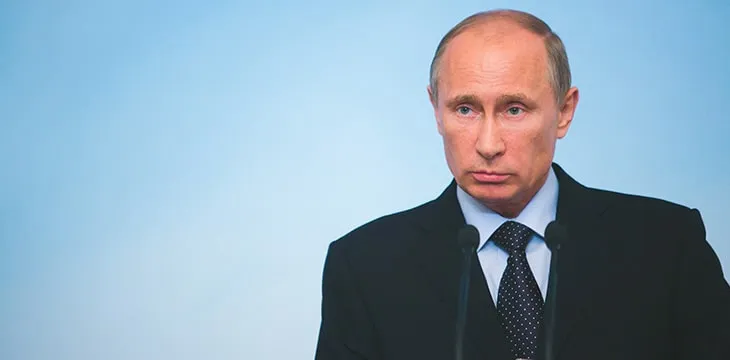|
Getting your Trinity Audio player ready...
|
Russian President Vladimir Putin has signed legislation prohibiting the use of digital assets as payments for goods and services.
Last week, Russia’s State Duma announced that Putin had signed Bill No. 138674-8 aka ‘On Amendments to Certain Legislative Acts of the Russian Federation in Regulating the Circulation of Digital Financial Assets and Utilitarian Digital Rights.’
The Duma’s Federation Council had sent the bill to Putin one week prior, after being introduced into the legislative body only several weeks before that, suggesting a sense of urgency in enshrining these changes into law ASAP.
The bill amends certain banking laws to permit the use of digital assets as investment vehicles, with the goal of increasing “the investment attractiveness of the use of digital rights by businesses.” The bill’s other main goal is “preventing the use of digital financial assets and utilitarian digital rights as a means of payment.”
Existing federal laws state unequivocally that “the official monetary unit (currency) of the Russian Federation is the ruble” and no other “monetary surrogates” are permitted. So-called ‘electronic platforms’ handling digital assets will now be “recognized as subjects of the national payment system” and thus fall under the scrutiny of the Bank of Russia, which will not look kindly on anyone attempting to usurp the ruble’s pre-eminence.
There is precedent for Russia siccing its central bank on online activities it views with suspicion. Midway through the last decade, Russia ordered the creation of centralized financial hubs through which all locally licensed sports betting sites were required to channel transfers to and from their customers. Bettors grumbled at the process of registering for this system, which included physically presenting identity documents at retail locations, but Russia insisted that Big Brother needed to know exactly who was doing what online. Can’t wait until Russia insists that all transfers on and off cryptocurrency exchanges are required to take a similarly centralized detour.
A more recent example of Russia’s increased interest in this sector saw the Rosfinmonitoring anti-money laundering bureau trumpeting advancements in identifying and tracking criminal use cases of digital assets. These advancements can’t come quickly enough, given that it was up to U.S. and German authorities to take down the Russia-based Hydra ‘darknet’ marketplace earlier this year.
War! What is it good for? Banning ruble alternatives!
Russia’s often chaotic approach to regulating digital assets has seen some government ministers promote greater adoption while the central bank pushes back hard against anything that might undercut its authority. One consistent feature is the belief that digital assets come with inherent risks that the average Ivan/Ivana has no business taking and thus their use should be restricted to ‘experienced’ investors who can take the hit if things go south in a hurry.
Putin is a notorious control freak and so it’s not all that surprising that, like many other authoritarian governments, Russia is exploring plans to create its own central bank digital currency. These plans took on new urgency following the economic sanctions imposed on Russia following its invasion of Ukraine earlier this year.
Putin’s antipathy toward non-state digital assets functioning as currency may have received a boost during the early days of the war, when Ukraine published digital wallet addresses to which individuals could send assets, which were then used to purchase materiel Ukraine needed to defend its territory against Russian troops.
(It should be noted that the popular narrative of goodhearted crypto bros siding with the plucky underdog proved wildly off-base, as most of the donations were made with the expectation of a reciprocal NFT airdrop that never came to pass, after which donations dropped off a cliff.)
With many western nations now unwilling to accept payments in rubles, Russia has suggested it could use digital assets to facilitate international trade. Here again, the government wishes to reserve a use case for itself that it deems inappropriate for average citizens. Still, it hardly matters, given that Vlad keeps threatening to unleash the nation’s nuclear arsenal if the world doesn’t agree that (a) he’s the strongest, toughest, most handsome world leader out there, (b) he’s the greatest hockey player that ever lived, and (c) he truly puts the ‘dick’ in ‘dictator.’
Watch: BSV Global Blockchain Convention panel, Law & Order: Regulatory Compliance for blockchain & Digital Assets
https://www.youtube.com/watch?v=R58jiNcC5mA

 07-12-2025
07-12-2025 





